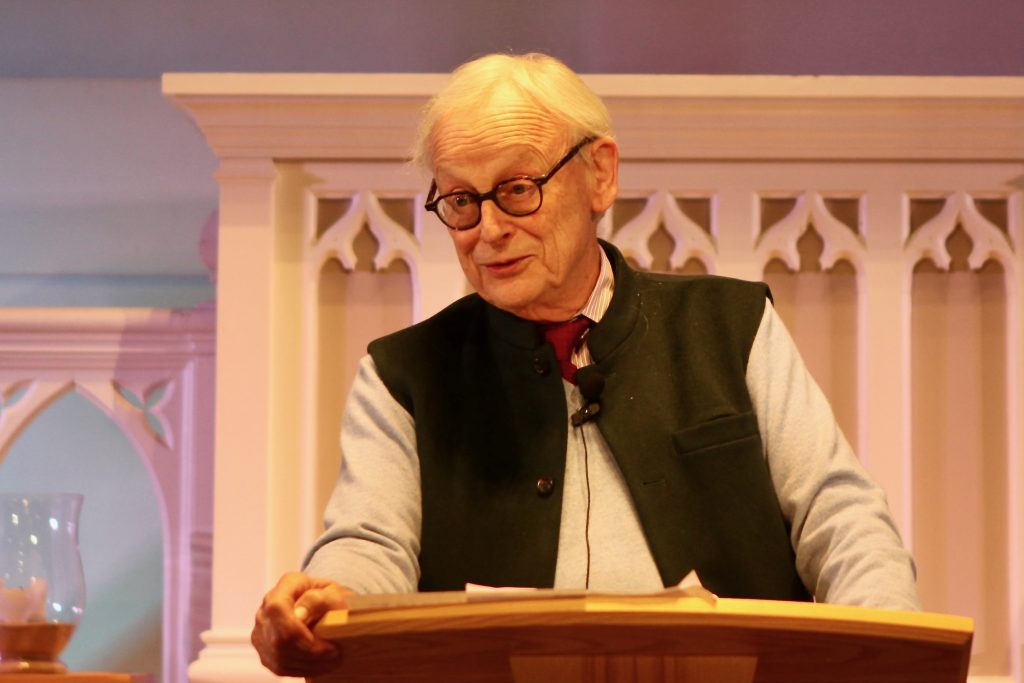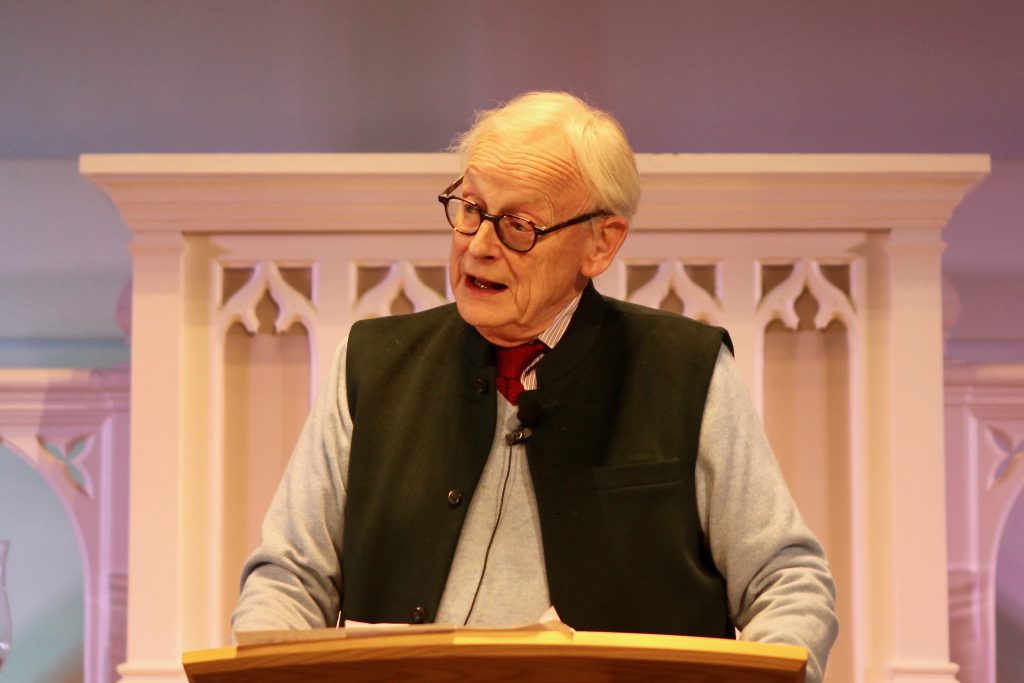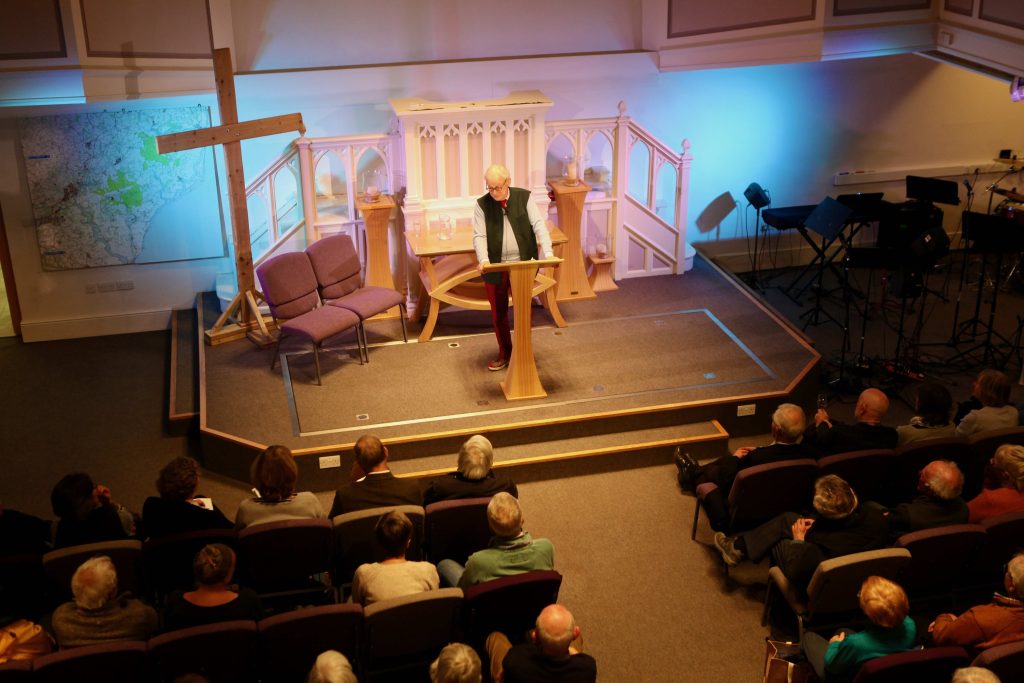By Tristan McConnell
Members of the River Deben Association (RDA) in October had the opportunity to hear an important and wide-ranging talk on climate change by Lord Deben, the former chair of the UK Climate Change Committee, and former Conservative Secretary of State for the Environment and MP for Suffolk Coastal.
During the 90-minute talk at Quay Street Church in Woodbridge on 27 October 2023, Lord Deben discussed and answered questions on, the impact of climate change on the planet and society, the politics of climate change in the UK, river pollution, energy costs and energy efficiency, renewable energy, and individual action and personal responsibility.
Titled Net Zero—where are we now?, the talk assessed the UK’s faltering progress towards achieving its own emissions targets, and cast a critical eye over the lack of political leadership and delivery as illustrated by last year’s government U-turn on North Sea oil and gas extraction and its backsliding on other climate mitigation issues, such as electric vehicles and domestic heat pumps, insulation, and solar panels.
Yet, despite this gloomy background, Lord Deben found grounds for hope in local action, local pressure, and local interventions.
Lord Deben began by noting the increased public awareness of climate change since 2012 when he began his 11-year tenure as chair of the independent Climate Change Committee. “I used to have to start every meeting by explaining to people that climate change was happening,” he said. “I don’t have to do that anymore.” Much of the discussion around climate change, he conceded, “doesn’t sound very cheery”, but he encouraged people to find hope in the widespread shift from skepticism to acceptance, such that the challenge of climate change today is action.
To bring home the seriousness—and interconnectedness—of climate change close to home Lord Deben reminded the audience that Spring now arrives many days earlier than in the past, such that flowers come out before the pollinators. “We have changed the way in which the world works,” he said, urging the audience to understand climate change as a symptom of the disconnect between humans and nature. “That image stops us thinking of climate change as if it was something different and separate from dealing with nature, dealing with biodiversity, cleaning up our rivers. It isn’t. It’s merely the symptom of all those things.”
“Climate change is not something different and separate from dealing with nature, dealing with biodiversity, cleaning up our rivers: climate change is the symptom of the degradation of all those things,” he said.
Referring to the River Deben, from which he took his title on joining the House of Lords, he said, “We have a dirty river, a polluted river, and therefore we don’t have the biodiversity that used to be true of our river. We have a river which has overflowed its banks, and that’s partly because of the way we have treated the river and not looked after it.”
Turning to grounds for optimism, Lord Deben emphasised the importance of recognising humanity’s remarkable abilities and achievements, and acknowledged the progress that is undoubtedly being made, but he argued that rather than do nothing while hoping new technology will provide a future solution, people must instead use the tools already available to address climate change now, today.
Much of the blame for the failure to do so, he said, lies with politicians of every stripe who are good at announcing policies but less good at keeping and delivering on promises.
Housebuilders were also called out for their failure to build homes that are “fit for the future”, and Lord Deben proposed a windfall tax on housebuilders to fund the retrofitting needed to turn new-build homes into net zero homes with heat pumps, solar panels, and better insulation. “We have built a million and a half homes which are not fit for the future, and the house building industry should be ashamed of itself, for what it did was to take a profit and hand the price on to the people they sold the houses to,” he said.
But blaming politicians and industry is no solution, nor are they solely responsible. Lord Deben pointed out the dissonance and hypocrisy that ordinary people routinely indulge in when confronted by the climate crisis: “We are extremely good at holding two wholly contrary views. On the one hand, something has to be done about climate change; on the other hand, not this because that affects me!” Public opinion has shifted, but public action has not caught up.
Insufficient public pressure allows governments, industries, and businesses to continue to avoid making the right and necessary decisions, he added, and that is something ordinary folk can change. “Nobody who believes that we’ve really got to act on climate change, should ever allow six months to pass without having gone to the surgery of their Member of Parliament and pressed it,” Lord Deben urged. Politics is ruled by those who press their case and when it comes to climate change “we are not good enough at pressing our case,” he said.
Confronting climate change is often presented as a choice—do this thing or that thing—but Lord Deben argued there is no need to choose between fighting climate change and tackling, for example, the cost-of-living crisis because they are the same battle.
“The things you have to do for climate change are exactly what you have to do to reduce prices: you have to move to renewables, you have to do more with less, you have to make sure that you are not wasting anything,” he said.
This is especially important in what is set to be an election year. “It doesn’t matter what the party is, no Member of Parliament or candidate should think they can get away without understanding that climate change is an existential issue which they have to face,” said Lord Deben.
A barrier to people making the right political choice is that they often don’t know what the right choice is, he said. “Information is hugely important,” Lord Deben said, adding that he was working with others to compile a publicly accessible database of all major parties’ candidates for the next election recording their voting record and position on climate change.
Individual pressure to affect government policy and industry practice is necessary, but so too is individual action. “Now I want to talk about you,” Lord Deben said, “what will you do?”
From reducing energy use in the home to taking the time to appreciate the nature around us, we can all take action and hold our elected leaders to account. “I can’t suggest that it’s going to be easy, but it’s necessary,” he said. Using energy saving lightbulbs or turning down the thermostat, are interventions that “are very small, but they add up”. Lord Deben said that waiting for high-level “systems change” is no solution at all, and that rather we must all play our role, however small, within the system that currently exists.
“Each of us in the businesses that we have, in the associations we belong to, the churches we go to—whatever they may be—can do our bit in that… then we can go to our Member of Parliament and say, ‘We are doing this, what are you doing to make it easier for us?’ If we do that then we will make the difference.”
There are today few people still seeking to deny climate change in the face of the overwhelming scientific and commonsense evidence, yet the debates still rage, in homes, pubs, and parliament, over what should be done, when, and what it should cost. Lord Deben scorned those, including in the media, who continue to tell people what they want to hear, “That it doesn’t really matter, that we don’t really have to do anything that’s uncomfortable.”
“The people who pretend to believe in climate change but say, ‘Not yet,’ ‘Don’t upset people,’ ‘Don’t make it difficult,’ ‘We’ll only proceed as long as everybody’s happy with it’. They are the appeasers!” he said.
The talk took in the environment and politics as well as concerns over costly and new but already outdated nuclear power infrastructure, the challenge of NIMBYism in renewable energy infrastructure, seasonal food production, and solar farms. It was nourishing food for thought for RDA members, and Lord Deben was careful to leave the audience with an uncomfortable question to mull about climate change, personal responsibility, and individual action.
“In the end, all of us are going to be asked by our grandchildren, the equivalent of ‘What did you do in the war?’, and every one of us is going to have to answer that question.” However, he added, “We should want to answer that question of our grandchildren, but it’s all moving so fast that we shall have to answer the question for ourselves.”
Tristan McConnell
Tristan McConnell is a writer and editor living in Woodbridge.



